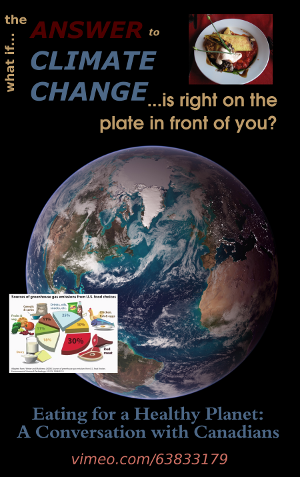
| HOME | ENVIRONMENT | HEALTH STUDIES | CRUELTY-FREE | RECIPES | KIDS ZONE! | RESOURCES & LINKS |

We live in an era of global crises:
- climate change threatens ecosystems around the globe and all beings who live in them,
- an industrial food system causes the suffering of billions of animals every year and untold environmental pollution,
- our western diet has led to unprecedented rates of obesity, diabetes, and other preventable diseases.
This is cause for great concern, but also great optimism. Environmental and health studies confirm that the transition to a plant-based diet is the single most effective change that individuals can make, with multiple win/win solutions benefitting human health, animal welfare, and the environment. (See further information and peer-reviewed studies on the Environment, Health Studies and Cruelty-Free pages.)
Fortunately, we can help the earth three times a day! Every time we eat, we can choose to be part of the problem or part of the solution. It's happening everywhere. The USDA reports that in 2012, 17 percent of the US population already make more than half of their weekly meals vegetarian. In the Netherlands, 40 percent of citizens now have at least 3 meat-free days per week. A sea change in the way we think about our food system is creating a revolution in plant-based meal planning. Archaic perceptions of having to eat bland, cold tofu are being swept away by international recipes proving how fantastic green and cruelty-free food can taste. It's inspiring!
Eating for a Healthy Planet: A Conversation with Canadians
This 55-minute documentary was produced as part of the University of Victoria Human Dimensions of Climate Change program (Canada). The film highlights the role of livestock agriculture in climate change, and international initiatives such as the 2009 EU "Less Meat Less Heat" summit in Brussels. Several interviews including one with the leader of our national Green Party, Elizabeth May, address shortcomings of government initiatives in Canada despite growing grass roots movements such as Meatless Mondays to reduce climate change. The environmental impact of livestock agriculture is so significant, that going one day a week meat-free achieves more greenhouse gas reductions than eating all-local foods, seven days a week.
Eating for a Healthy Planet: Trailer
Eating for a Healthy Planet: A Conversation with Canadians




WHY MEATLESS MONDAYS?
It's a brilliant idea gone global: because livestock agriculture is one of the largest contributors to global warming, reducing consumption of animal products just one day a week is one of the most effective ways we can decrease our carbon footprint (except of course doing it seven days a week!). The Meatless Monday campaign is an international movement that invites people to replace meat with plant-based options in their diet, one day a week. The movement is promoted by celebrities such as Paul McCartney in the UK and medical institutions such as the John Hopkins Bloomberg School of Public Health.
Read more at: Source
Make a difference today:
- Buy Local Food — through Farmers Markets, Farm Gate Sales, etc. (find yours here)
- Buy Organic — avoid GMOs, pesticides and support sustainable agriculture
- Reduce or eliminate your consumption of animal products. For more information visit:

from Peta.org: Bill Clinton Named PETA's 2010 Person of the Year
 Former President Bill Clinton, who is renowned for his
charisma and eloquence, has worked to shed light on numerous global issues
through his humanitarian efforts and his many public speaking engagements. Recently, he has been promoting the benefits of vegan eating after
changing his eating habits to improve his health. Thanks to his new plant-based diet, he's shed some pounds, decreased his risk of future heart
problems, and spared the lives of many animals.
Former President Bill Clinton, who is renowned for his
charisma and eloquence, has worked to shed light on numerous global issues
through his humanitarian efforts and his many public speaking engagements. Recently, he has been promoting the benefits of vegan eating after
changing his eating habits to improve his health. Thanks to his new plant-based diet, he's shed some pounds, decreased his risk of future heart
problems, and spared the lives of many animals.
Because he uses his influence to promote the benefits of following a vegan diet, PETA is pleased to name Bill Clinton its 2010 Person of the Year.
Studies have proved that vegetarians and vegans live, on average, six to 10 years longer than meat-eaters. One reason why President Clinton took a step toward going vegan is that he wanted to make sure that he would be around to enjoy his future grandchildren now that his daughter, Chelsea, is married. Since then, Clinton says that his metabolism has improved, and he now weighs as much as he did in high school—so he's definitely on the right track. "I live on beans, legumes, vegetables, fruit," he said. "I drink a protein supplement every morning. No dairy."
By choosing a plant-based diet, President Clinton has spared the lives of nearly 200 animals a year and reduced his risk of cancer, strokes, and other diseases. Of course, the reasons for going vegan don't end there. The meat industry also contributes to world hunger, exploits workers, and devastates the environment.
Because he uses his influence to promote the benefits of following a vegan diet, PETA is pleased to name Bill Clinton its 2010 Person of the Year. You can join President Clinton in helping to save animals by trying a vegan diet. Take our pledge to be vegan for 30 days and see the benefits for yourself.
Source

This web site provides education links to documented studies on how food affects:
...and gives additional:
- recipes and menu ideas for healthier eating
- resources to view and download including videos and health studies

Eating for a Healthy Planet: email
Back to TOP OF PAGE



“Nothing will benefit human health and increase the chances for survival of life on Earth as much as the evolution to a vegetarian diet.”
— Albert Einstein

“The single action that a person can take, an individual can take, to reduce carbon emissions is vegetarianism...There are many things that people can do to reduce their carbon emissions, but changing your light bulb and many of the things are much less effective than changing your diet, because if you eat further down on the food chain rather than animals, which have produced many greenhouse gases, and used much energy in the process of growing that meat, you can actually make a bigger contribution in that way than just about anything. So, that, in terms of individual action, is perhaps the best thing you can do.”
Dr. James Hansen, NASA Climatologist
In the News:
“UN Urges Global Move to Meat and Dairy-Free Diet; June 2, 2010
A global shift towards a vegan diet is vital to save the world from hunger, fuel poverty and the worst impacts
of climate change, a UN report said today.
As the global population surges towards a predicted 9.1 billion people by 2050, western tastes for diets rich in meat and dairy products are unsustainable, says the report from United Nations Environment Programme's (UNEP) international panel of sustainable resource management.
Read more at: Source

 EarthSave Canada
EarthSave Canada